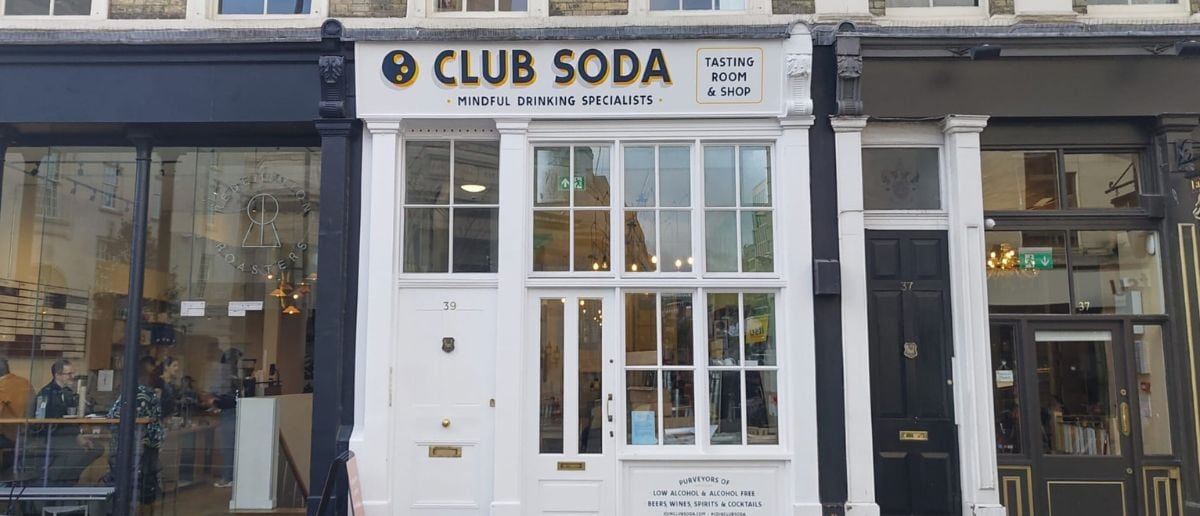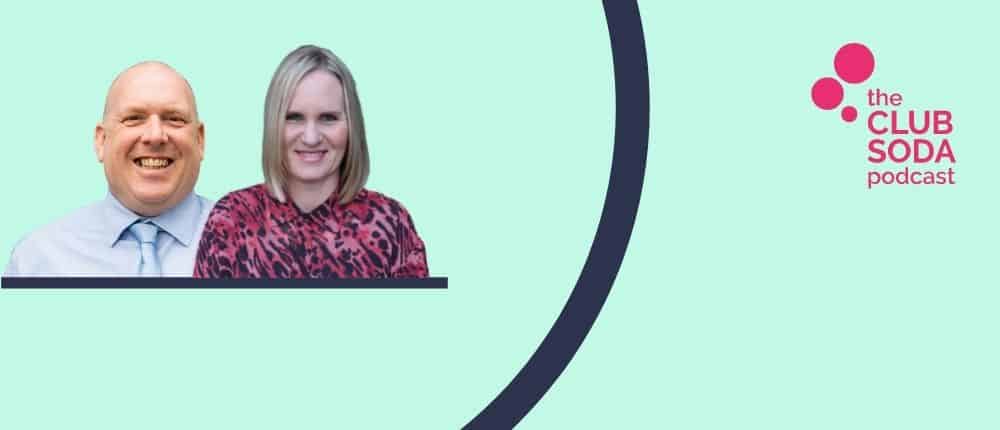
This website uses cookies to improve your experience. We'll assume you're ok with this, but you can opt-out if you wish. Read More
The Next Round: What happens after you change your drinking?

We don’t normally put trigger warnings on our blogs and podcasts at Club Soda. If ever there was a subject that needed it, though, it’s alcohol and trauma. Trauma is a very personal experience. For those of us who’ve combined alcohol and trauma as a means to cope, this conversation is challenging. For this reason, we urge you to decide for yourselves if you’re in the right headspace to hear it.
Our discussion today is with trauma specialists Mark, founder of School for Inspiring Talents and Life Chance Education, and his wife Victoria, a therapist specialising in trauma and addiction.
Husband and wife super team Mark and Victoria Escott connected through their own recovery journeys from drugs, alcohol and trauma. Now, they help others who have had traumatic experiences. Trauma could be from a car accident, divorce, or childhood abuse. Their career paths are different but their work centres around the same goal: to help those in need of help to deal with alcohol and trauma.
Mark is the CEO and co-founder of Life Chance Educations. He brings personal experience and professional training to his role in helping vulnerable children deal with adverse experiences in their early years. This led Mark to found the School for Inspiring Talents and Life Chance Education, where he helps children and their families heal from trauma and the unhealthy coping mechanisms, such as addiction, that have let them to seek help.
Victoria is a specialist counsellor for alcohol, drugs, addictive/destructive behaviour, trauma and PTSD. In recent years, Victoria’s therapeutic practices have centred around people who have experienced a wide range of trauma. Victoria has a wealth of experience in dealing with addictions due to trauma and is particularly interested in attachment theory.
The reason that this subject is so tricky is two-fold. As our guests discuss with Club Soda co-founder Dru, once we get a grip on problem drinking, often the uncomfortable feelings that we were masking with alcohol come to the fore. Without our coping mechanism, often that trauma feels completely overwhelming. But, as Victoria and Mark adeptly point out, there are many ways to process trauma without giving up on our drinking goals. From self-soothing to individual or family therapy, there are many ways to find the right support. That includes our community right here at Club Soda.
As human beings, we need connection, and we need safety. So any community that comes together where you have a connection, where you can have social elements going on, feels safe. In my book, the more options there are of those things, the better their chances are of being successful because we do we need each other.
Victoria Escott
We couldn’t have put it better ourselves. At Club Soda, we believe that connection is the superpower of behaviour change. We believe in this so much that we facilitate connection at every chance we can. You can communicate with others who are looking to cut down, take a break, or quit drinking in many different ways.
This website uses cookies to improve your experience. We'll assume you're ok with this, but you can opt-out if you wish. Read More
| Name | Domain | Purpose | Expiry | Type |
|---|---|---|---|---|
| wpl_user_preference | joinclubsoda.com | WP GDPR Cookie Consent Preferences. | 1 year | HTTP |
| PHPSESSID | www.tickettailor.com | PHP generic session cookie. | 55 years | HTTP |
| AWSALB | www.tickettailor.com | Amazon Web Services Load Balancer cookie. | 7 days | HTTP |
| YSC | youtube.com | YouTube session cookie. | 55 years | HTTP |
| Name | Domain | Purpose | Expiry | Type |
|---|---|---|---|---|
| VISITOR_INFO1_LIVE | youtube.com | YouTube cookie. | 6 months | HTTP |
| Name | Domain | Purpose | Expiry | Type |
|---|---|---|---|---|
| _ga | joinclubsoda.com | Google Universal Analytics long-time unique user tracking identifier. | 2 years | HTTP |
| sbjs_migrations | joinclubsoda.com | Sourcebuster tracking cookie | 55 years | HTTP |
| sbjs_current_add | joinclubsoda.com | Sourcebuster tracking cookie | 55 years | HTTP |
| sbjs_first_add | joinclubsoda.com | Sourcebuster tracking cookie | 55 years | HTTP |
| sbjs_current | joinclubsoda.com | Sourcebuster tracking cookie | 55 years | HTTP |
| sbjs_first | joinclubsoda.com | Sourcebuster tracking cookie | 55 years | HTTP |
| sbjs_udata | joinclubsoda.com | Sourcebuster tracking cookie | 55 years | HTTP |
| sbjs_session | joinclubsoda.com | SourceBuster Tracking session | Session | HTTP |
| Name | Domain | Purpose | Expiry | Type |
|---|---|---|---|---|
| mailchimp_landing_site | joinclubsoda.com | Mailchimp functional cookie | 28 days | HTTP |
| __cf_bm | tickettailor.com | Generic CloudFlare functional cookie. | Session | HTTP |
| NID | google.com | Google unique id for preferences. | 6 months | HTTP |
| Name | Domain | Purpose | Expiry | Type |
|---|---|---|---|---|
| _ga_10XZMT03ZM | joinclubsoda.com | --- | 2 years | --- |
| AWSALBCORS | www.tickettailor.com | --- | 7 days | --- |
| cf_clearance | tickettailor.com | --- | 1 year | --- |
| VISITOR_PRIVACY_METADATA | youtube.com | --- | 6 months | --- |
Join Club Soda for 10% off your first order of drinks for UK delivery. Plus get our latest news and special offers for members to choose better drinks, change your drinking and connect with others.
If you get an error message with this form, you can also sign up at eepurl.com/dl5hPn